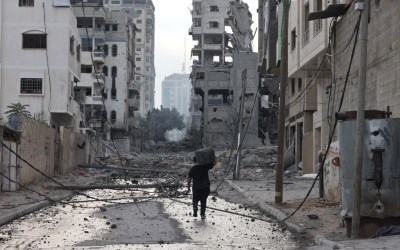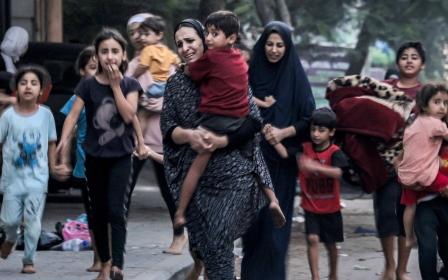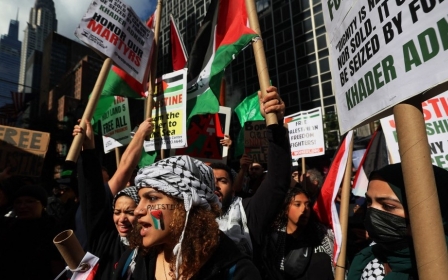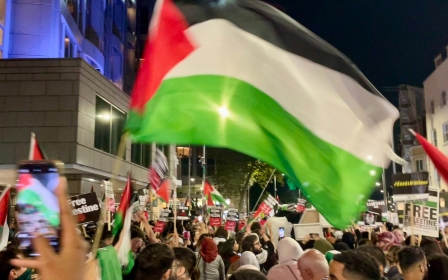Israel-Palestine war: Bodies piling up in the streets as Gaza onslaught escalates
As residents of Gaza awoke on Wednesday morning, following another night of Israeli bombardment, they bore witness to what was left of al-Karama complex, an area in the besieged enclave that contained several residential towers housing hundreds of families.
The Israeli military dropped 100 bombs on the neighbourhood in two hours on Tuesday night, as people were inside their homes, Palestinian eyewitnesses have said.
"I was in this warehouse, sitting. Ten minutes before the bombing, we left... the neighbours told us the Israeli army told them to evacuate the entire area," said Abu Foad.
He said his neighbourhood was now littered with "corpses in the street".
"My home was here - it’s gone. All of it. All the street is gone. It was random bombing."
New MEE newsletter: Jerusalem Dispatch
Sign up to get the latest insights and analysis on Israel-Palestine, alongside Turkey Unpacked and other MEE newsletters
The continuous bombing from 8pm to 10pm completely destroyed roads leading to the area, leaving emergency workers unable to reach the wounded.
Almost 12 hours later, bodies were still scattered all over the place and the wounded had yet to be evacuated to hospitals.
"It was heinous, indiscriminate bombardment without warning," Abdelaziz Helo, a resident who survived the assault, told Middle East Eye.
"People were in their homes when the bombs began raining down on the area hysterically. It turned it into a block of flame. No women, no children, no men were able to move or leave the area," he said.
"We were going door to door looking for each other. I couldn't identify my own children from all the smoke and blood covering us."
Initial reports say the army used thermobaric weaponry (vacuum bombs) and white phosphorus in the attack. MEE could not independently verify the reports.
'It was a massacre'
The bombardment of Gaza came in retaliation for a Hamas attack over the weekend that has so far left more than 1,000 Israelis dead.
On Wednesday, Prime Minister Benjamin Netanyahu labelled the assault "an attack whose savagery… we have not seen since the Holocaust".
Israel's strikes on the Gaza Strip have so far left at least 950 Palestinians dead.
Prior to the onslaught, residents of the area had lost connection and contact with the outside world, Helo said. They were also running short on water and food.
"It was a massacre targeting civilians. This is a civilian residential area. There is not even the slightest feature of any military equipment or work here. They did not warn us or send any messages beforehand," Helo said.
"We had told relatives in other areas to come stay with us because this is considered a safe area. We did not expect it to be bombed like this."
Foad said that despite the destruction, the people of Gaza would be "stronger with every bombing" the Israelis carried out.
"Even if they kill our women, elderly, children, we will not be afraid of them. This time we entered the Gaza envelope and we will do it again and again," he said.
"We will not be silent on this situation, until they leave our lands. Their bombing is in vain. If they kill one person, 10 people will be born. No matter what Netanyahu does, we will get stronger."
Middle East Eye delivers independent and unrivalled coverage and analysis of the Middle East, North Africa and beyond. To learn more about republishing this content and the associated fees, please fill out this form. More about MEE can be found here.





